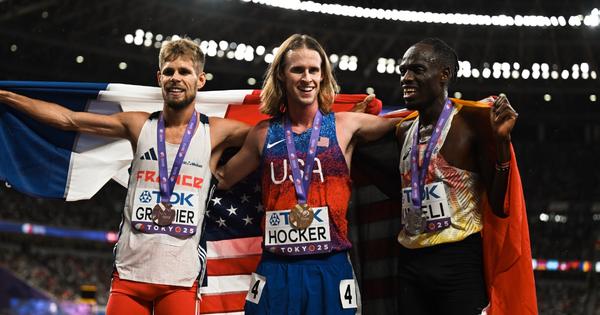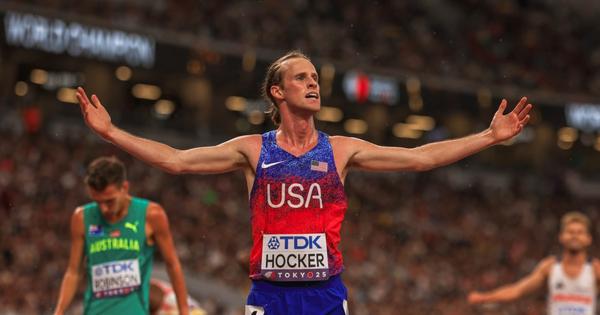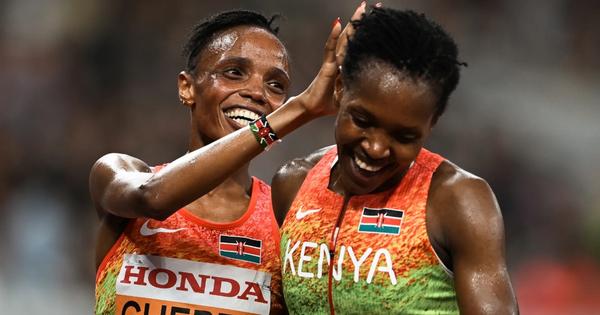By Paul Snyder
September 24, 2025
The winning times from a global championship’s middle-distance and distance events can serve as something of a Rorschach test for fans.
Does a winning 10,000m race nearly three minutes off of the world record appear to make you a malevolent little goblin? A scourge on the sport, a textbook case of cowardly, tactical, fast-forward-through-the-replay racing? Or does your brain fill in the gaps with delight—surely this race was a rich tapestry of contrasting strategies and last minute charges for glory?
When you squint in the direction of two 800m finals that came within about a second of the fastest anyone’s ever covered a half mile, do you see a figure emerging from the fog, arms outstretched in victory, having conquered the limits of what’s humanly possible? Or does the formless blob remain that—a pileup of spent bodies laid to waste by a predictable race of attrition?
Well, readers. The good news is, whatever you thought about the often tactical and occasionally hot pacing of the longer finals from Worlds, you’re all right.
Four mid-D and average-D finals played out “honestly”—the men’s and women’s 800m (in the year 2025, can you even imagine a championship 800m going tactical?), the women’s steeple, which was won a very respectable seven seconds off of the fastest time ever run, and the women’s 1500m, which was won by the world record holder in a top-20 all-time showing.
While the order of finishers wasn’t likely what you expected, it’s pretty safe to say that only three of the 12 podium athletes across these four races were true surprises—women’s 800m champ Lilian Odira, steeple bronze medalist Sembo Almayew, also of Ethiopia, and 1500m second-placer Dorcus Ewoi, of Kenya.
What that tells us is that faster races have a tendency to play out in more expected ways. Sure, there’s often a bit of shuffling near the top, but when the pace is hot from start to finish, it’s pretty logical that the best athletes will prevail.
The upside is that the medalists in those events are more likely to represent who actually had the best seasons, top to bottom. It’s not exactly a controversial opinion to think that the World Championship should be won by who is truly the best athlete in a given discipline! And of course, it’s fun to watch people run fast—at the most lizard-brained level, isn’t that what draws so many of us to this sport in the first place?
The downside is that for those of us who like to break down the stats, unpack the storylines, and generally chop it up with post race arguments analysis, “the best person won” just isn’t all that compelling most of the time. While upsets are possible in fast races—Odira is a great example!—they’re far less common. Not to get too philosophical, but why do we watch sports in the first place, if not to relinquish some control over our lives and feel the rush of unpredictability through a medium that ultimately doesn’t come with any material personal risks?
And if that’s the kind of pompous-sounding ethos that defines your fandom, then we have great news. There were some truly unexpected, narrative-defying outcomes at this World Championships, as we have discussed above already. And those were only possible from the 1500m and up because the majority of those events were won in slow times, sometimes comically so, particularly for the men. Of course, unpredictability only goes so far when you have titans like Beatrice Chebet and Faith Kipyegon dominating the 5000m…
The obvious con to this style of racing is that we’ve become so accustomed to the sport’s stars posting ridiculous times on the circuit that we feel shortchanged when the results—which don’t tell the whole story—look more like an NCAA conference championship than the battle for the world champ title.
Blame it on the weather. Blame it on the male tendency to believe they’re all above average finishers and better off in a sit and kick affair (which, definitionally can’t be true!). Blame it on generally better high-end parity. Whatever caused it, the fellas really dogged the early laps of the 1500m, steeple, 5000m, and 10,000m, and accordingly, pretty much the whole field was still in it when the decisive move was being made late in the race.
No knock at Isaac Nader, Geordie Beamish, Cole Hocker, or Jimmy Gressier, but based solely on PBs—yeah, yeah, races aren’t run on paper!—had their finals required running near world record pace, it feels less likely they’d be the 2025 champions. But that’s the beauty of truly slow championship affairs: it’s not just that they leave a larger pool of possible champions in contention, it’s that that larger pool leads to bizarre tactical decisions and outcomes. It’s not enough to have the best kick off a doddering pace—you’ve got to be in the right position to bypass maybe a dozen bodies to unleash that kick successfully.
Shocking results are the primary reason track geeks might hope for a laughably slow first kilometer split, but the other big draw is that across rounds, you get to see athletes test out and learn from different strategies. Hocker is a prime example. After a controversial disqualification from his 1500m semifinal—the result of riding the rail then running out of room to pass—you could see the cogs spinning in his head in the 5000m qualifying then final, where he opted to lead a bulk of the race outright and make his passes on the outside, respectively. There’s simply less an athlete can learn from an all-out effort, record-setting race, aside from “you’d better be as fit as possible and feel as good as you’ve ever been or you’re toast.”
Perhaps the takeaway is that a championship full of one kind of race is boring. Having a sprinkling of both – and no guarantee that any one event will play out one way or another – is the best of both worlds.

Paul Snyder
Paul Snyder is the 2009 UIL District 26-5A boys 1600m runner-up. You can follow him on Bluesky @snuder.bsky.social.




